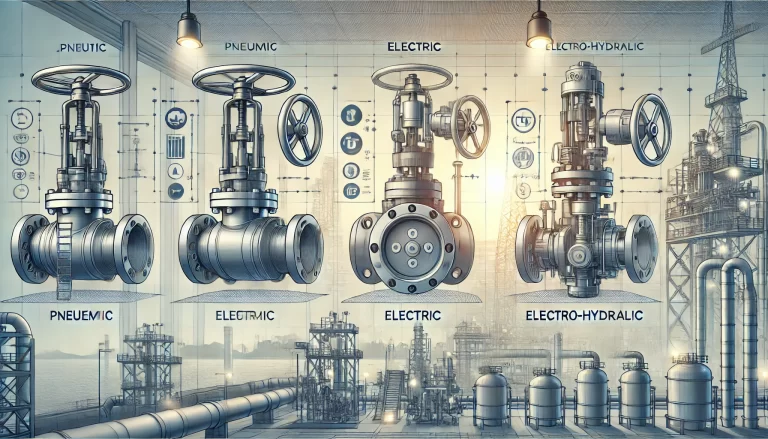Control valves play a critical role in petrochemical plant design, directly impacting operational efficiency, safety, and cost. Selecting the right type of valve—whether pneumatic, electric, or electro-hydraulic—can be challenging due to varying application requirements. This article provides an in-depth analysis of these three types of valves, discussing their working principles, advantages, disadvantages, and suitable use cases.
1. Pneumatic Valves
Working Principle: Pneumatic valves operate using compressed air as the power source. The valve’s movement is controlled by adjusting the air pressure and flow, enabling the valve to open or close as required.
Advantages:
Simplicity and Reliability: Pneumatic valves are mechanically simple and highly reliable, making them easy to maintain.
Safety in Explosive Environments: Since compressed air does not produce sparks, pneumatic valves are ideal for areas with high explosion risks.
Quick Response: Pneumatic valves operate swiftly, making them suitable for emergency situations where rapid shut-off is needed, such as in oil transportation pipelines.
Disadvantages:
Dependence on Air Supply: The performance of pneumatic valves heavily relies on a stable air supply. Fluctuations in air pressure can lead to inaccurate operation.
Limited Precision: They are less suitable for applications requiring highly precise flow control.
Applications: Pneumatic valves are commonly used in processes requiring fast and reliable control in hazardous environments, such as oil transfer pipelines or emergency shutdown systems.

2. Electric Valves
Working Principle: Electric valves use an electric motor to control the valve’s movement. By adjusting the motor’s direction and angle, precise control of the valve’s opening is achieved.
Advantages:
High Control Precision: Electric valves excel in applications requiring fine adjustments of flow rates, such as in petrochemical synthesis.
No Need for Compressed Air: Unlike pneumatic valves, electric valves do not require a separate air supply system, offering greater installation flexibility.
Automation Integration: These valves can be seamlessly integrated with automated systems, enhancing operational efficiency.
Disadvantages:
Safety Concerns in Explosive Areas: Electric motors can generate sparks, posing a risk in environments with flammable gases.
Complex Maintenance: The intricate structure increases the likelihood of failure and raises maintenance costs.
Applications: Electric valves are ideal for precise flow regulation in processes like fine chemical production, where accuracy is crucial.
3. Electro-Hydraulic Valves
Working Principle: Electro-hydraulic valves convert electrical signals into hydraulic pressure to drive the valve’s movement. Hydraulic oil is used to exert the force needed for operation, allowing these valves to handle heavy-duty tasks.
Advantages:
Combines Precision and Power: These valves merge the precise control of electric systems with the robust power of hydraulic systems.
Handles Large Loads: Suitable for high-pressure, large-diameter pipelines where substantial force is needed to operate the valve.
Disadvantages:
Complex System: Electro-hydraulic systems require additional components such as hydraulic stations, making them costlier to install and maintain.
Environmental Risks: Hydraulic oil leakage can lead to environmental damage and operational hazards.
Applications: Electro-hydraulic valves are used in large-scale systems requiring high accuracy and force, such as in main pipelines of petrochemical plants.

Conclusion
Selecting the appropriate control valve for a petrochemical project depends on the specific requirements of the application:
For hazardous environments requiring rapid action, pneumatic valves are preferred.
For processes demanding high precision and flexibility, electric valves are the optimal choice.
For heavy-duty applications involving large-diameter or high-pressure pipelines, electro-hydraulic valves offer unmatched performance.
Each type of valve has its strengths and limitations. It is crucial to evaluate factors such as operational conditions, safety requirements, and maintenance capabilities when making a decision. A careful selection process ensures operational efficiency, cost-effectiveness, and safety in petrochemical projects.
